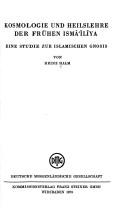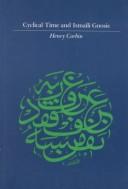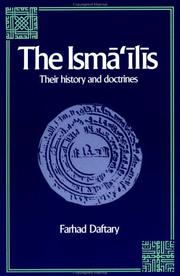| Listing 1 - 10 of 16 | << page >> |
Sort by
|

ISBN: 3515026754 9783515026758 Year: 1978 Volume: 44/1 Publisher: Wiesbaden Steiner
Abstract | Keywords | Export | Availability | Bookmark
 Loading...
Loading...Choose an application
- Reference Manager
- EndNote
- RefWorks (Direct export to RefWorks)
Ismailites --- Ismaili --- Ismailians --- Assassins (Ismailites) --- Shīʻah --- Ismailis

ISBN: 0710300476 0710300484 Year: 1983 Publisher: London Kegan Paul
Abstract | Keywords | Export | Availability | Bookmark
 Loading...
Loading...Choose an application
- Reference Manager
- EndNote
- RefWorks (Direct export to RefWorks)
Ismailites --- Ismaéliens --- Doctrines --- -Ismaili --- Ismailians --- Assassins (Ismailites) --- Shīʻah --- -Doctrines --- Ismaéliens

ISBN: 0521370191 0521429749 9780521429740 9780521370196 Year: 1992 Publisher: Cambridge Cambridge University press
Abstract | Keywords | Export | Availability | Bookmark
 Loading...
Loading...Choose an application
- Reference Manager
- EndNote
- RefWorks (Direct export to RefWorks)
297 --- Ismailites --- Ismaili --- Ismailians --- Assassins (Ismailites) --- Shīʻah --- Islam. Mohammedanisme --- Ismailites. --- Ismailiten. --- Geschichte. --- Doctrines --- History --- Ismailis
Book
ISBN: 1927494648 9781927494646 9781927494639 192749463X 9781927494271 1927494273 Year: 2015 Publisher: Toronto
Abstract | Keywords | Export | Availability | Bookmark
 Loading...
Loading...Choose an application
- Reference Manager
- EndNote
- RefWorks (Direct export to RefWorks)
Ismailites --- Islam --- Religion --- Philosophy & Religion --- Ismailians --- Ismailis --- Assassins (Ismailites) --- Shīʻah --- Keshavjee, Mohamed M. --- Keshavjee family. --- South Africa --- Africa, South
Book
ISBN: 1784531529 085773850X 1786739437 0755608984 9781786739438 Year: 2015 Publisher: London ; New York : I.B. Tauris, in association with the Institute of Ismaili Studies,
Abstract | Keywords | Export | Availability | Bookmark
 Loading...
Loading...Choose an application
- Reference Manager
- EndNote
- RefWorks (Direct export to RefWorks)
"I.B.Tauris in association with the Institute of Ismaili Studies Few fields of Islamic studies have witnessed as much progress in modern times as Ismaili studies, and in even fewer instances has the role of a single individual been as pivotal in initiating progress as that of Wladimir Ivanow (1886-1970), whose memoirs are now published here for the first time. The breakthrough in modern Ismaili studies occurred mainly as a result of the recovery and study of a large number of texts relating to the field, which had not been available to the earlier generations of orientalists. The Persian and Arabic Ismaili manuscripts, many edited and published by Ivanow, reflect a rich diversity of intellectual and literary traditions. Ivanow left his native Russia soon after the October Revolution of 1917 and settled in India where he was formally commissioned in 1931 by Sultan Muhammad Shah Aga Khan III, the 48th Imam of the Nizari Ismailis, to investigate the history and teachings of the Ismailis. Henceforth, Ivanow began the systematic recovery and study of texts from this tradition of Shi'i Islam, discovered in India, the Middle East and Central Asia, amongst other regions. He also played a key role in the establishment of the Ismaili Society - the first research institution of its kind with a major collection of Ismaili manuscripts. Ivanow made these manuscripts available to other scholars, thereby contributing to further progress in the field. Ivanow completed his memoirs, entitled Fifty Years in the East, in 1968, shortly before his death. This work, originally written in Russian, is comprised of an autobiography and vivid accounts from his travels. These convey his ethnologist's interest in 'the archaeology of the way of life' and profound curiosity for regional customs and languages. The memoirs, written in Tehran during Ivanow's final years, have now been edited with substantial annotations by Farhad Daftary. They reveal for the first time the circumstances under which modern Ismaili studies were initiated and an eyewitness account of several regions during the early decades of the twentieth century before the rapid onset of modernisation."--Bloomsbury publishing.
Ismailites. --- Ivanow, Wladimir. --- Ismailians --- Ismailis --- Assassins (Ismailites) --- Shīʻah --- Ivanow, W. --- Ivanow, Vladimir Alekseevich --- Иванов, Владимир Алексеевич --- Ivanov, Vladimir Alekseevich --- ايوانف ، ولاديمير --- و. ايوانف --- Memoirs.
Book
ISBN: 131687091X 1316870952 1316650472 1316870995 1316871010 1316871053 1107154081 1316871037 9781316871058 9781316650479 9781316871010 9781316871034 9781107154087 Year: 2017 Publisher: Cambridge New York
Abstract | Keywords | Export | Availability | Bookmark
 Loading...
Loading...Choose an application
- Reference Manager
- EndNote
- RefWorks (Direct export to RefWorks)
This book explores the evolution of a Shia Ismaili identity and crucial aspects of the historical forces that conditioned the development of the Muslim modern in late colonial South Asia. It traces the legal process that, since the 1860s, recast a Shia Imami identity for the Ismailis, and explicates the public career of Imam Aga Khan III amid heightened religious internationalism since the late-nineteenth century, the age of 'religious internationals'. It sheds light and elaborates on the enduring legacies of questions such as the Aga's understanding of colonial modernity, his ideas of India, restructured modalities of community governance and the evolution of Imamate-sponsored institutions, key strands in scholarship that characterized the development of the Muslim and Shia Ismaili modern, and Muslim universality vis-à-vis denominational particularities that often transcended the remits of the modular nation and state structure.
Ismailites --- Shīʻah --- Shiites --- Shia Muslims --- Shiah Muslims --- Shiahs --- Shias --- Shiite Muslims --- Muslims --- Ismailians --- Ismailis --- Assassins (Ismailites) --- Imamites --- Shia --- Shiism --- Twelvers (Islam) --- Islamic sects --- Alids

ISBN: 2900269229 9782900269220 Year: 1982 Publisher: Paris Berg international
Abstract | Keywords | Export | Availability | Bookmark
 Loading...
Loading...Choose an application
- Reference Manager
- EndNote
- RefWorks (Direct export to RefWorks)
Ismailites --- Doctrines. --- 297.1 --- -Ismaili --- Ismailians --- Assassins (Ismailites) --- Shīʻah --- Islam:--religieuze vraagstukken : indelen zoals 291.1/.8 --- Doctrines --- -Islam:--religieuze vraagstukken : indelen zoals 291.1/.8 --- 297.1 Islam:--religieuze vraagstukken : indelen zoals 291.1/.8 --- Ismailites - Doctrines.
Book
ISBN: 3110539888 3110541793 9783110541793 9783110541809 3110541807 9783110539882 9783110539769 3110539764 Year: 2017 Publisher: Berlin Boston
Abstract | Keywords | Export | Availability | Bookmark
 Loading...
Loading...Choose an application
- Reference Manager
- EndNote
- RefWorks (Direct export to RefWorks)
Al-Mu'ayyad bi-llah al-Haruni (d. 411/1020) was a representative of the intellectual center of the Zaydiyya in Northern Iran and a student of the leading Muʿtazilite theologians of the time. In his Kitab Ithbat nubuwwat al-nabi he presents a proof of prophecy of Muḥammad and a refutation of the Isma'ilyya.The present volume explores the historical and intellectual context of the oeuvre and includes a partial critical edition of the text.
Ismailites --- Ismailians --- Ismailis --- Assassins (Ismailites) --- Shīʻah --- Doctrines. --- Muʼayyad billāh Aḥmad ibn al-Ḥusayn, --- Controversial literature. --- Muʼayyad billāh Aḥmad ibn al-Ḥusayn, 944 or 945-1030?.
Book
ISBN: 0755607791 178672460X 1786734605 9781786724601 9781780761299 1780761295 Year: 2012 Publisher: London ; New York : I.B. Tauris,
Abstract | Keywords | Export | Availability | Bookmark
 Loading...
Loading...Choose an application
- Reference Manager
- EndNote
- RefWorks (Direct export to RefWorks)
"Researchers have shed light on the literary production of the Ismailis since the early 1930s. The cataloguing of these work has been carried out by Ivanow, Fyzee, Goriawala, Poonawala, Gacek, Cortese and de Bloise. Many works attributable to Ismaili scholars, however, are still unavailable either because they remain hidden in private collections or because they have not survived. Ismaili law, in particular, is still a largely unexplored field of study. Al-Qadi Abu Hanifa al-Nu'man is generally considered the founder and greatest exponent of Ismaili jurisprudence, Many of his works have been lost, and information on some others is scattered; yet other works remain in manuscript form, and only a few have been published. The present book is a critical edition and translation of al-Nu'man's Minhaj al-fara'id, based on its three known copies. It deals with the law of inheritance, one of the most complex in Islamic law. In comparing the Minhaj with two published works (the Da'a'im al-Islam and Kitab al-iqtisar) as well as a manuscript (Mukhtasar al-athar) of al-Nu'man, a significant doctrinal evolution clearly emerges, reflecting his early Maliki training and then his work under four Fatimid imams. Ismaili law is also compared with the doctrines of the Imami school as well as the legal system of the four Sunni schools. This book thus allows us to determine the time of the composition of the Minhaj al-fara id, the development and the originality of Ismaili jurisprudence, and its relation to other schools of law--Bloomsbury Publishing."
Islamic law --- Inheritance and succession (Islamic law) --- Ismailites. --- Ismailians --- Ismailis --- Assassins (Ismailites) --- Shīʻah --- History. --- Nuʻmān ibn Muḥammad, Abū Ḥanīfah, --- Islamic law. --- Reception. --- Reception of Islamic law --- History
Book
ISBN: 1474479588 9781474479585 9781474479592 Year: 2022 Publisher: Edinburgh : Edinburgh University Press,
Abstract | Keywords | Export | Availability | Bookmark
 Loading...
Loading...Choose an application
- Reference Manager
- EndNote
- RefWorks (Direct export to RefWorks)
This book tells the story of a manuscript repository found all over the pre-modern Muslim world: the khizanat al-kutub, or treasury of books. The focus is on the undisclosed Arabic manuscript culture of a small but vibrant South Asian Shi'i Muslim community, the Bohras. It looks at how books that were once part of one of the biggest imperial book repositories of the medieval Muslim world, the khizanat of the Fatimids of North Africa and Egypt (909CE-1171CE) ended up having a rich social life among the Bohras across the Western Indian Ocean, starting in Yemen and ending in Gujarat. It shows how, under strict conditions of secrecy, and over several centuries, one khizana was turned into another, its manuscripts gaining new meanings in the new social realities in which they were preserved, read, transmitted, venerated and copied into. What emerged was a new distinctive Bohra Ismaili manuscript culture shaped by its local contexts.
Ismailites --- Manuscripts, Arabic --- Ismailians --- Ismailis --- Assassins (Ismailites) --- Shīʻah --- Arabic manuscripts --- 091 =927 --- 091 <540> --- 091 <540> Handschriftenkunde. Handschriftencatalogi--India --- Handschriftenkunde. Handschriftencatalogi--India --- 091 =927 Handschriftenkunde. Handschriftencatalogi--Arabisch --- Handschriftenkunde. Handschriftencatalogi--Arabisch --- Church libraries.
| Listing 1 - 10 of 16 | << page >> |
Sort by
|

 Search
Search Feedback
Feedback About UniCat
About UniCat  Help
Help News
News